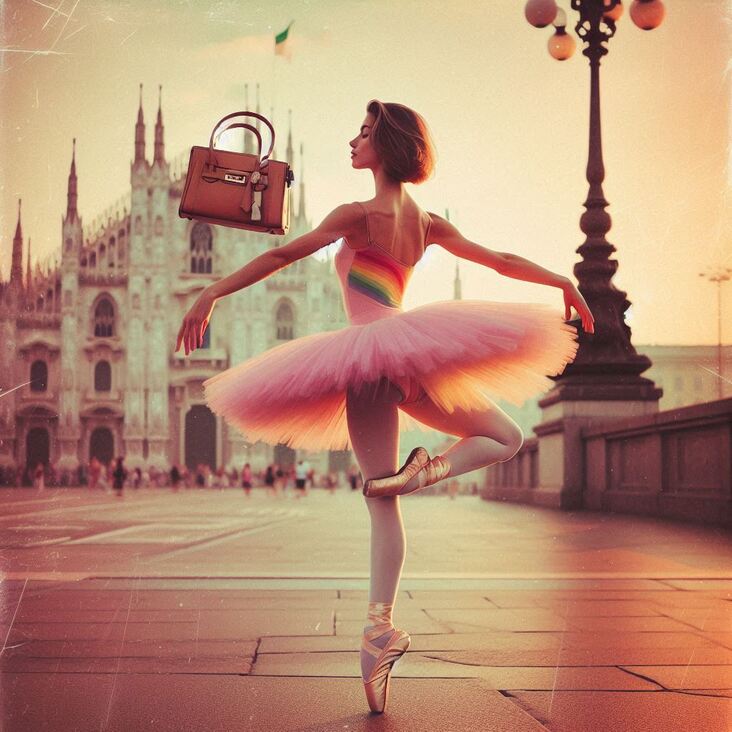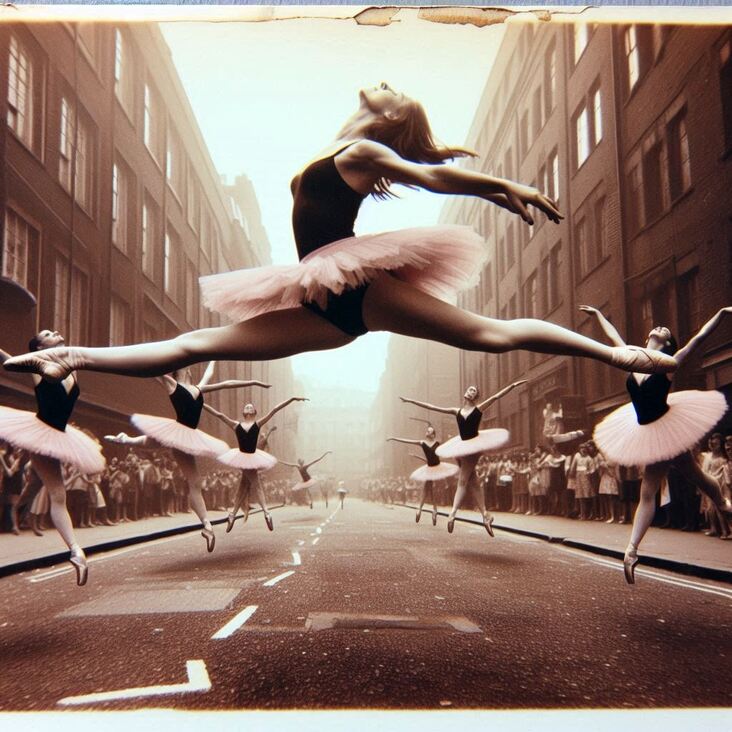
Hello darling tutus! It's your favourite pink-tutu-wearing time traveller, Emma, back with another Tuesday blast from the past for you lovely lot. And this week's topic, my lovelies? The tutu. It's a garment that screams "grace", "elegance", and "twirling" – just a little bit about myself.
But as much as we adore it, what is the story behind the humble tutu? How did it get so iconic, and why are they now more popular than ever? Let's dive into the glamorous history of the tutu, my darlings!
(And just a little disclaimer for you, my gorgeous readers, as you’ll see below, while this might sound a bit…intensely femme – well, who doesn’t love a tutu, right? – this is how tutus went from a basic garment to what we all know and love today – and honestly? We wouldn't have it any other way. So prepare for some frills! )
Before the Tutu:Believe it or not, ballet didn't always involve frilly tutus. Back in the early days, ballerinas wore pretty practical dresses that covered their knees, often with long, flowing sleeves and heavy, embroidered fabrics. Fancy, but not exactly practical for high kicks, jumps, and pirouettes!
Our lovelies were a bit more restrained – I mean, come on, everyone wants to feel like a princess – even when they were performing, and these dancers wanted to move gracefully but they couldn’t! It just wasn’t practical.
Then… Cue a fashion revolution, darlings!
Enter Marie Taglioni - and The Romantic EraI adore this period – it’s so decadent. In the 1830s, Marie Taglioni was a big deal, darling! You see, back then, the Romantic Era (don't confuse that with 'romance', darlings. Think of it more like a philosophy!) was huge.
Well, in this time of “romanticism” - where art had a bit of magic and fantasy - you'll see a HUGE change in fashion, darling – think of a Victorian novel, or something out of Shakespeare with its grandeur – think beautiful castles and soaring melodies!
Think Swan Lake or Giselle, that ethereal style was really revolutionary.
That's where Marie comes in. Her moves, her performances - so light! Well, darlings, they just couldn’t have these incredible movements, the light-footedness, the delicacy that she's famed for while being constrained in this massive ballgown-esque, heavily embroidered costume.
The era is called romantic, right?
So we needed movement and we needed to express this! And this is when our friend the tutu steps in, my darlings!
Marie Taglioni - a dancing icon and an incredible trendsetter - is believed to have introduced the first ‘real’ tutus. Instead of being so much fabric and long, she came up with the concept of what is now the romantic tutu. You know, the little shorter, but still ankle-length (as the idea was to be long and flowing but also allowing movement - we just can't not show off a pretty leg!) – It allowed for the grace and airiness that the dancers were really aiming for, which then went hand-in-hand with this ethereal, 'feminine' side of the Ballet. Beautiful, right?!
(Although my gorgeous girls will tell you: we really love all the frills… the more ruffles, the more beautiful! But let’s take it slow, right?)
The Evolution of the Tutu: (We have to take things slow, lovelies!)Now we all know tutus can be different shapes and styles – there are so many of them now – from the super-short tutu to that romantic tutu. What changed after Marie's success with her light and fluid tutus? Well, there were different periods where fashion changed with a whole load of other styles:
(The fun thing is? When I say ‘fashion changed’, that doesn’t just go for the clothes out of ballet - this reflects in what dancers are wearing on stage! Isn’t that amazing? Fashion is really everywhere! )
And ballet tutus, my lovelies? Reflected all of these!
For example: There’s a tutu called ‘the platter tutu’, that’s super popular – and was especially huge in the early 20th century! I think this might be my favourite…It looks like a gigantic circle!
The other thing about tutus, lovelies, is the difference between Classical and Modern. (Which really go hand in hand, especially in this age of travel! A lot of us really love getting from one theatre to another!).
Classical tutus, which really reflects those elegant Romantic tutu-style, the flowy styles we saw before are very structured, they’re made with many layers, giving the tutu a really stiff, graceful, ‘big’, and very structured look, like Marie’s, as I was saying! It’s also very feminine. Gorgeous!
You can't really compare to a ‘modern tutu* which is designed to look lighter, and has fewer layers, they can have even the barest few! What’s great is this really gives us freedom and a real Modern touch… And a lot more expression (I've actually done the full, ‘no tutu’, all about the dancing and modern style in Paris – you have to see this if you can! It was an eye-opener.)
Now my darlings, as much as we all love the frill, there are, if we’re being practical, different tutus – there’s a classical tutu you see in ‘The Nutcracker, but you’d have *never see a ballerina do the ‘ballet on pointe’ with this kind of romantic tutu in those first ballet shows.
So yes, my darlings, those shorter, very fitted, ones we often see on stage for the ‘ballet on pointe’ we know, the Classical tutu, those are called the ‘pointe* tutus’* ! They’re for more elaborate moves that have high leg positions with a strong technique. That’s what’s great about dancing. A lot of dancers wear the pointe tutu even though they can move very gracefully as this makes them more able to be the ‘perfect* dancer!
(Which I’ll come back to, darlings – because this really gives the idea of perfection - of which we’ll speak of next Tuesday!) We just love to be the most graceful!
So next time you're at a ballet show, pay attention to those magnificent tutus, lovelies! There’s an entire history to them! The shape, the structure… they all reflect an era and even a specific dancer, especially when you think about someone like Marie Taglioni, someone that influential, darling.
From romantic to classical, the story of the tutu continues to inspire.So don’t be afraid to try out some different kinds of tutus, my lovelies! It's all part of the magic, the beauty, the art, the joy of wearing a tutu, dancing, and the sheer, effortless grace and beauty we all strive for - after all, we all just love a twirl or two - which I hope we've all learned just how important it is!
It’s really about expressing yourself fully, darling, so let your tutu be your wings, your inspiration - wear them with confidence, wear them with joy - and wear them with *love and enjoy every twirl.
Until next Tuesday my darlings. Stay glamorous, keep shining, and let's all make every day a Tutu Tuesday!
(And a special shout-out to you lovely lot reading this in my own Derbyshire, England – that’s what makes a great day in the Tutu life: A trip down memory lane back home, and sharing with you! And how about a pink cupcake? 🧁 )
**With Love**,
**Emma**
Pink-tutu.com

